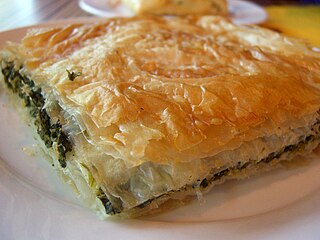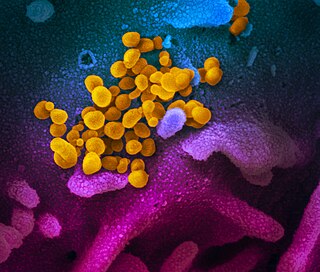
In botany, a fruit is the seed-bearing structure in flowering plants that is formed from the ovary after flowering.

Spinach is a leafy green flowering plant native to central and Western Asia. It is of the order Caryophyllales, family Amaranthaceae, subfamily Chenopodioideae. Its leaves are a common edible vegetable consumed either fresh, or after storage using preservation techniques by canning, freezing, or dehydration. It may be eaten cooked or raw, and the taste differs considerably; the high oxalate content may be reduced by steaming.

Savory spinach pie, is the traditional pastry in a family of pastries or pies found in the Balkans, Middle East and Central Asia. This particular version is filled with chopped spinach, feta cheese or some other variety of white cheese, and egg as a basic recipe.

The American Heart Association (AHA) is a nonprofit organization in the United States that funds cardiovascular medical research, educates consumers on healthy living and fosters appropriate cardiac care in an effort to reduce disability and deaths caused by cardiovascular disease and stroke. They are known for publishing guidelines on cardiovascular disease and prevention, standards on basic life support, advanced cardiac life support (ACLS), pediatric advanced life support (PALS), and in 2014 issued the first guidelines for preventing strokes in women. The American Heart Association is also known for operating a number of highly visible public service campaigns starting in the 1970s, and also operates several fundraising events.

Citrus greening disease or yellow dragon disease is a disease of citrus caused by a vector-transmitted pathogen. The causative agents are motile bacteria, Liberibacter spp. The disease is transmitted by the Asian citrus psyllid, Diaphorina citri, and the African citrus psyllid, Trioza erytreae, also known as the two-spotted citrus psyllid. It has no known cure. It has also been shown to be graft-transmissible.

Coliform bacteria are defined as either motile or non-motile Gram-negative non-spore forming bacilli that possess β-galactosidase to produce acids and gases under their optimal growth temperature of 35–37 °C. They can be aerobes or facultative aerobes, and are a commonly used indicator of low sanitary quality of foods, milk, and water. Coliforms can be found in the aquatic environment, in soil and on vegetation; they are universally present in large numbers in the feces of warm-blooded animals as they are known to inhabit the gastrointestinal system. While coliform bacteria are not normally causes of serious illness, they are easy to culture, and their presence is used to infer that other pathogenic organisms of fecal origin may be present in a sample, or that said sample is not safe to consume. Such pathogens include disease-causing bacteria, viruses, or protozoa and many multicellular parasites.

Börek or burek is a family of pastries or pies found in the Balkans, Middle East and Central Asia. The pastry is made of a thin flaky dough such as filo with a variety of fillings, such as meat, cheese, spinach, or potatoes. Boreks are mainly associated with the Middle East, Armenia, and also with the former Ottoman Empire, including the Balkans and the South Caucasus, Eastern European and Central European countries, Northern Africa and Central Asia. A borek may be prepared in a large pan and cut into portions after baking, or as individual pastries. They are usually baked but some varieties can be fried. Borek is sometimes sprinkled with sesame or nigella seeds, and it can be served hot or cold.

Sindhi cuisine refers to the distinct native cuisine of the Sindhi people from Sindh, Pakistan. Sindhi cuisine has been influenced by Central Asian, Iranian, Mughal food traditions. It is mostly a non-vegetarian cuisine, with even Sindhi Hindus widely accepting of meat consumption. The daily food in most Sindhi households consists of wheat-based flat-bread (phulka) and rice accompanied by two dishes, one gravy and one dry with curd, papad or pickle. Freshwater fish and a wide variety of vegetables are usually used in Sindhi cuisine. Restaurants specializing in Sindhi cuisine are rare, although it is found at truck stops in rural areas of Sindh province, and in a few restaurants in urban Sindh.
The 2006 North American E. coli outbreak was an Escherichia coli O157:H7 outbreak from prepackaged spinach. The outbreak occurred in September 2006, and its origin was an Angus cattle ranch that had leased land to a spinach grower. At least 276 consumer illnesses and 3 deaths have been attributed as a result from the outbreak.

A smoothie is a beverage made by puréeing ingredients in a blender. A smoothie commonly has a liquid base, such as fruit juice or milk, yogurt or ice cream. Other ingredients may be added, including fruits, vegetables, non-dairy milk, crushed ice, whey powder or nutritional supplements.

Verticillium dahliae is a fungal plant pathogen. It causes verticillium wilt in many plant species, causing leaves to curl and discolor. It may cause death in some plants. Over 400 plant species are affected by Verticillium complex.
Albugo occidentalis, the causal agent of spinach white rust, is an oomycete plant pathogen, although some discussions still treat it as a fungal organism. Albugo occidentalis is one of the most important spinach diseases in North America, found throughout the United States east of the rocky mountains.
Heterodera trifolii is a plant pathogenic nematode.

Popeye: Rush for Spinach is a Game Boy Advance video game based on the comic strip of same name created by E. C. Segar, licensed from King Features Entertainment. It was developed by French studio Magic Pockets and published by Namco in 2005, and Atari Europe in 2006.

Gnudi are gnocchi-like dumplings made with ricotta cheese instead of potato, with semolina. The result is often a lighter, "pillowy" dish, unlike the often denser, chewier gnocchi. Gnudi is the Tuscan word for "naked", the idea being that these "pillowy" balls of ricotta and spinach are "nude ravioli", consisting of just the tasty filling without the pasta shell. By tradition, in Tuscany, these dumplings are served with burnt butter and sage sauce, sprinkled with Parmigiano or Pecorino Toscano cheese.

Driven by fresh-market use, the consumption of spinach has been on the rise in the United States. Per capita use of fresh-market spinach averaged 1 kilogram (2.2 lb) during 2004–06, the highest since the mid-1940s. The fresh market now accounts for about three-fourths of all US spinach consumed. Much of the growth over the past decade has been due to sales of triple-washed, cello-packed spinach and, more recently, baby spinach. These packaged products have been one of the fastest-growing segments of the packaged salad industry.
Dilute was an indie and math rock band from Fremont, California, active from 2001 to 2004. Its members have been in bands such as Okay, Natural Dreamers, 31knots, and Jacques Kopstein. They have two full-length studio albums, The Gypsy Valentine Curve (2001) and Grape Blueprints Pour Spinach Olive Grape (2002), and a live album with Hella. They had been signed through three record labels, 54 40 or Fight!, Toad Records, and Sickroom Records.

Disease X is a placeholder name that was adopted by the World Health Organization (WHO) in February 2018 on their shortlist of blueprint priority diseases to represent a hypothetical, unknown pathogen that could cause a future epidemic. The WHO adopted the placeholder name to ensure that their planning was sufficiently flexible to adapt to an unknown pathogen. Director of the US National Institute of Allergy and Infectious Diseases Anthony Fauci stated that the concept of Disease X would encourage WHO projects to focus their research efforts on entire classes of viruses, instead of just individual strains, thus improving WHO capability to respond to unforeseen strains. In 2020, experts, including some of the WHO's own expert advisors, speculated that COVID-19, caused by the SARS-CoV-2 virus strain, met the requirements to be the first Disease X.

Food safety in the United States relates to the processing, packaging, and storage of food in a way that prevents food-borne illness within the United States. The beginning of regulation on food safety in the United States started in the early 1900s, when several outbreaks sparked the need for litigation managing food in the food industry. Over the next few decades, the United States created several government agencies in an effort to better understand contaminants in food and to regulate these impurities. Many laws regarding food safety in the United States have been created and amended since the beginning of the 1900s. Food makers and their products are inspected and regulated by the Food and Drug Administration and the Department of Agriculture.
Spinach cake is cake that contains spinach mixed into the batter.














